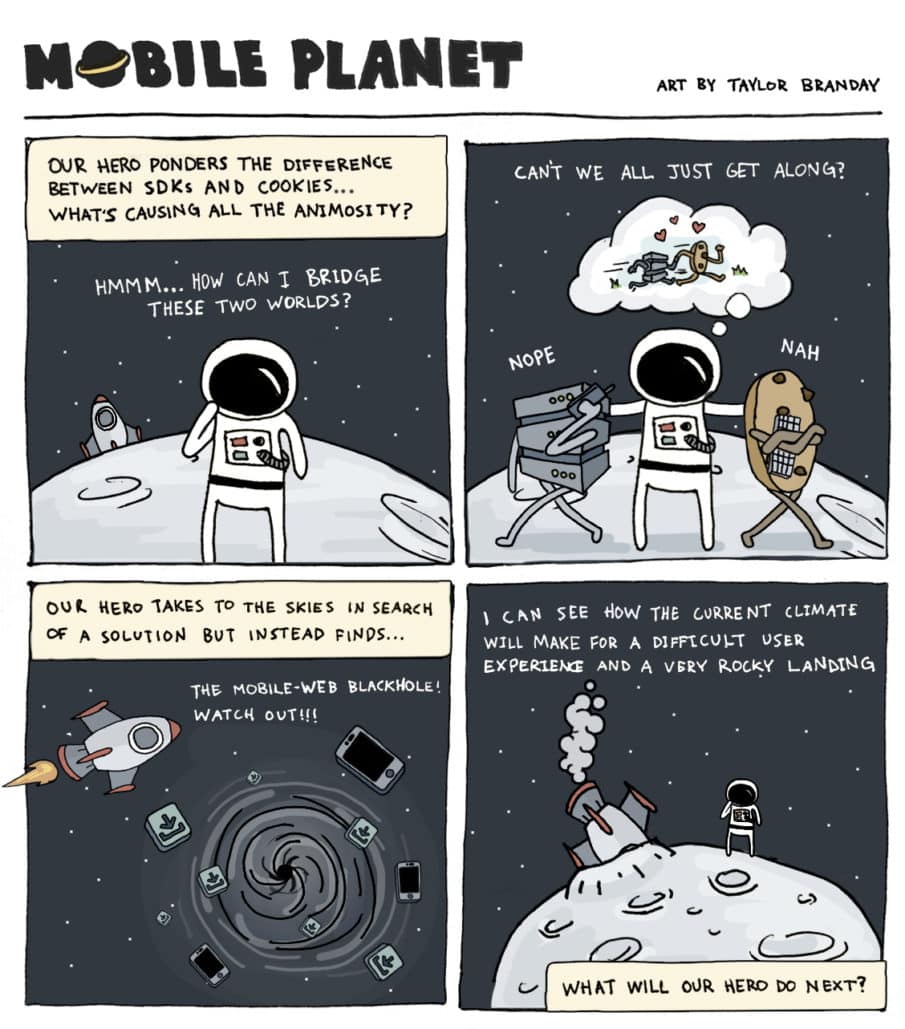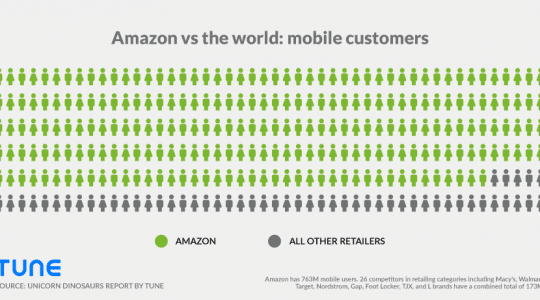
Last we left our brave hero, he was exploring a mobile planet where two factions existed. One was tied to the traditional way of tracking affiliate conversions on desktop web; the other embraced a more modern approach to tracking and attributing conversions within mobile app environments. Ideally, the two sides come together and find a single solution that embraces the best qualities of both, and we live happily ever after.
But it is usually more complicated than that. There are barriers to change that each side perceives as obstacles at best and deal breakers at worst. In the second part of this short series on mobile affiliate marketing, we will dive into these perceived barriers and assess strategies to overcome them.
Barrier #1: The Organizational Walls
For most companies born before the emergence of mobile, there is an organizational challenge to solve. Namely, mobile apps and mobile web have been tacked on as an afterthought to these organizations. Mobile is treated as a separate entity and strategy, an offshoot from the core business and the marketing efforts for it.
Why? It may be that companies that did not grow up with mobile viewed its inception as an experiment or a skunkworks operation. Until recently, organizational structures did not take into account the idea that the organizing construct is not channel, but growth. Businesses that look at growth as the overarching goal tend to bring their mobile and desktop teams together to join forces. Companies that do not view growth in the same way tend to separate out the teams the build apps from those that drive desktop traffic.
The bottom line is this: if you are not a mobile-first (or as we call it, a MobileBest) company, chances are your teams are built in silos. And that mentality must change so that cross-team collaboration between user acquisition and affiliate partnerships can take shape.
Barrier #2: The Links, Stink!
The second big hurdle is finding a de facto standard of tracking and attribution between desktop and mobile. Let’s face it, with two tracking paradigms, the links … well, stink!
Why? There are black holes in every corner of the cross-channel universe. Black holes mean that partners who spent their hard-earned money on marketing on the brand’s behalf are not getting properly compensated. And what does that do? It means that a given brand’s conversion rate looks pretty poor to those affiliates, and thus, they hold off on promoting that brand. That’s a bad outcome no matter how you slice it.
Legacy tracking is penalizing mobile marketers, as many Traditional Desktoppers do not believe it is possible to properly attribute mobile traffic.
Here is the current state of the ecosystem:
- ~40% of transactions aren’t accurately tracked on mobile when relying on traditional affiliate network technology on mobile.
- Brands believe that the world of mobile attribution is too probabilistic and unreliable to use for affiliate use cases.
- Brands believe that ITP 2.X and Chrome’s restrictions have made accurate attribution impossible.
Barrier #3: The UX, SUX!
The third hurdle that needs to be solved for is user experience. If we are honest with ourselves, most mobile affiliate marketing experiences — sending a user from web to app, or desktop web to mobile web, or app to app — are not ideal. Or, to be more (brutally) direct, the user experience (UX) sucks.
A lack of sound technology solutions is deterring brands from taking time to properly integrate these landing paths. As such, companies leave conversion rates unoptimized and limit the possibilities of properly attributing mobile traffic. They don’t have faith in the post-click conversion funnel, and there is scant evidence that any one company has found the way to build a truly scalable solution for it.
Many Traditional Desktoppers don’t understand (or care) how landing pages work on mobile; most hate the thought of potentially losing a customer by pushing them to download a mobile app. But are those fears really justified?
Here’s the thing about mobile: it includes both mobile web and mobile apps. Generally, mobile apps do a better job converting users than mobile web, but not all users have your mobile app installed. In the heat of the moment right after a click, you don’t want to fool around trying to get the user to install the app. You want them to buy, and buy now!
Luckily, mobile measurement partners (MMPs), Apple, and Google have all already thought about this problem and have a solid solution for it. This solution is where routing comes into play, and it involves two concepts that require some explanation.
- Deep linking: Deep linking lands a user in a specific location within an app or on a specific page of a website, as opposed to sending them to the app’s home screen or the website’s home page.
- Apple Universal Links and Android App Links: These links intelligently route a user to the optimal destination depending on whether or not a user has the relevant app installed. For example, if you have the app on iOS, a Universal Link will land you deep within the app. If you do not have the app installed, the link will route you to a landing page on mobile web.
Thus, mobile experiences can provide the best of both worlds: a high-converting app route when the app is installed on a device, and a mobile web flow to fall back on when it’s not. The attribution works deterministically for both!
In Addition, Mobile Affiliates and Partners Are a Mystery …
One very practical hurdle to working more closely with mobile affiliates is a lack of familiarity with who the players are or how to form relationships with mobile developers or mobile apps. Given the mobile form factor, brands have to think differently about the creative and content that work better in native contexts. For these companies, integrating with large mobile partners or affiliate networks can create a lot of anxiety. Do regular links even work?
Some of these fears are legitimate, but many are a function of experience. Yes, mobile is slightly different when it comes to performance marketing. But, most of your customers’ eyeballs are already on mobile! That means that many or most of the same partners that work for traditional web also work for mobile.
… and Mobile Fraud Scares Everyone Away
The last issue is one that has been amplified by the headlines in the news: brands are genuinely concerned about mobile ad fraud, and many feel that mobile networks are full of bad actors and are therefore untrustworthy.
Concern is warranted. However, much of this concern can be resolved through technology. The key to preventing mobile fraud is truly understanding the way it works within the mobile channel. Interestingly, mobile fraud is not that different than the kind of fraud found in the desktop ecosystem; in many cases, it’s actually the same thing just with a different name.
Beyond transactional fraud, which is the job of the brand to police, the most relevant type of mobile ad fraud to guard against is attribution fraud, including:
- Apps and/or SDKs secretly stuffing clicks.
- Apps and/or SDKs performing click injection.
- Faked conversions via bots and device farms.
- SDK conversion spoofing.
We can help you parse through this, as we have a lot of experience dealing with all types of mobile fraud. Head over to our blog for a whole series on it, including articles on the types of mobile fraud, the impact of click fraud, and how to prevent mobile fraud.
While fraud is never truly going to completely disappear, do not get thrown off by the headlines that tend to sensationalize the threat of mobile fraud. Fact is, all fraud is bad fraud.
So, Where Do We Go From Here?
Now that we have covered why advertisers need to change and the barriers that were supposedly preventing them from doing so, we’re ready to move on to making that change happen. In Part 3 of this series, we explore how to bring together these affiliate marketing worlds by identifying the technology they share, translating the opportunities that already exist, and (re)introducing the partners that make it all possible.
Want to skip the series? Get the whole story in our e-book, “Mobile Planet: A Brave New World for Affiliate Partnerships.”
Author
Becky is the Senior Content Marketing Manager at TUNE. Before TUNE, she handled content strategy and marketing communications at several tech startups in the Bay Area. Becky received her bachelor's degree in English from Wake Forest University. After a decade in San Francisco and Seattle, she has returned home to Charleston, SC, where you can find her strolling through Hampton Park with her pup and enjoying the simple things in life.




Leave a Reply
You must be logged in to post a comment.